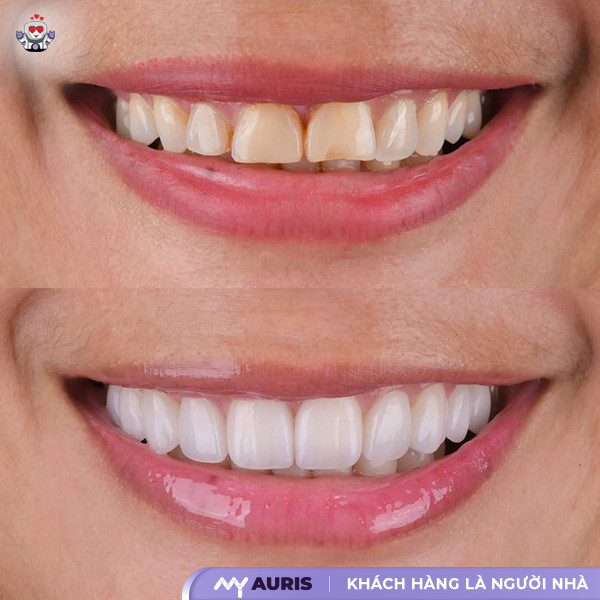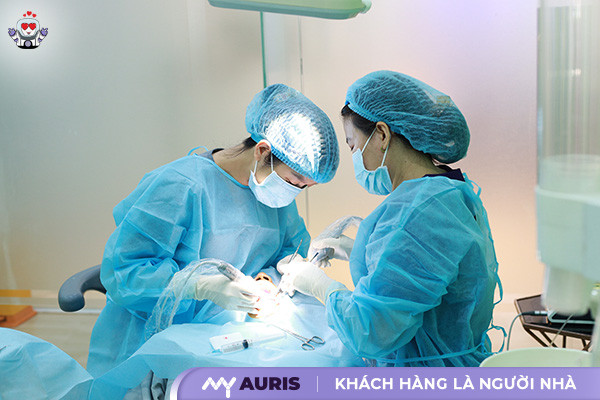After meticulous crafting, porcelain crowns are securely bonded to the natural tooth abutment with specialized dental adhesive, ensuring high durability and aesthetics. However, there are still reasons why porcelain crowns can fail or fall off, causing many to worry about how to handle a dislodged crown.
Can a dislodged porcelain crown be reattached? The answer is yes, if handled correctly. The first crucial step is to retrieve the porcelain crown if it’s intact, then thoroughly clean the area where it fell off to prevent infection. You should avoid chewing on the side where the crown came off to prevent further damage and promptly visit a dentist for examination and appropriate treatment. Don’t let a minor incident affect your oral health. Let My Auris Dental Clinic delve deeper into the causes of dislodged or damaged porcelain crowns and effective solutions in the article below!
Why Do Porcelain Crowns Fall Off?
One of the most common reasons for a porcelain crown to fall off is weak cement or incorrect bonding technique. When the porcelain crown is not securely attached to the natural tooth, its adhesion decreases, making it prone to dislodging during eating.

Excessive Biting Force or Chewing Hard Foods
Excessive chewing force or habits like eating very hard foods such as ice, bones, sugarcane, etc., can cause the porcelain crown to shift or detach from the tooth abutment. Continuous high-impact forces weaken the bond between the natural tooth and the porcelain crown, making the issue of a dislodged crown a concern for many.
Expired Lifespan of Porcelain Crowns
Porcelain crowns can also chip or fall off due to reaching the end of their lifespan. Over time, the bonding cement between the tooth abutment and the crown can wear down due to the effects of food, saliva, and bacteria, causing the crown to become loose and easily dislodged.
Poor Dentist Skill
A critical factor that cannot be overlooked is the dentist’s skill. If the bonding process is not precise or an insufficient amount of adhesive is used, the crown’s retention will be poor. Consequently, the porcelain crown may come loose or fall off after only a short period of use.
Tooth Bone Resorption Reduces Porcelain Crown Support
When tooth bone resorption occurs, the foundation supporting the crown is no longer stable. Bone loss around the tooth due to missing teeth or periodontal disease weakens the structure, causing the porcelain crown to fall off. The solution is to promptly treat and restore the bone to maintain the stability of the porcelain crown.
Incorrect Oral Hygiene
Incorrect brushing, using excessive force, or a hard toothbrush can expose the tooth roots, affecting the bond between the crown and the natural tooth. Gradually, the porcelain crown may become loose, causing inconvenience and impacting aesthetics.

How to Fix a Chipped or Dislodged Porcelain Crown
When a porcelain crown chips or a denture falls out, the first crucial step is not to attempt a home remedy. Instead, you should visit a dental clinic as soon as possible, where a qualified dentist with modern supporting equipment can provide the safest and most accurate solution.
If the natural tooth abutment is still healthy and the porcelain crown is intact, the dentist will reattach the crown using specialized dental cement, securing it firmly as it was originally.
If the porcelain crown is fractured, broken, or has reached the end of its lifespan, the dentist will need to readjust the natural tooth abutment, then take an impression for a new replacement porcelain crown, ensuring a better fit and greater durability.
To minimize damage or dislodgement of porcelain crowns, you should:
- Choose a reputable dental clinic with a team of highly skilled dentists and modern equipment.
- Maintain a balanced diet, avoiding excessively hard or very hot/cold foods.
- Practice thorough oral hygiene with proper brushing habits.
- Visit the dentist every 6 months for scaling and a check-up of your porcelain crowns, helping to detect any potential issues early.
Signs of a Chipped Porcelain Crown
The detailed guide below will help you accurately check the condition of your porcelain crown so you can take appropriate action and seek dental care when necessary.
Visual inspection: Do you notice a crack, an unusual line, or a small missing piece? The chipped area might reveal a different color. If you see a darker spot, it could be the underlying metal framework (for PFM crowns) or the color of the prepared natural tooth. This confirms that the outer ceramic layer has fractured. Look at the biting edges, which bear the most chewing force and are also prone to chipping.
Tactile sensation with tongue and finger: Use your tongue to glide over the surface and edges of each porcelain crown. A chipped crown will feel sharp, rough, or noticeably uneven. Carefully run your index fingertip over the edges of the porcelain crown. Any roughness or an unusual sharp edge is an important warning sign.
Signs during eating and daily activities: Sensitivity indicates exposure of the sensitive underlying dentin. You might experience a dull ache or sharp pain when consuming hot, cold, sweet, or sour foods. Pain or discomfort when biting or chewing food, as pressure on the chipped area can cause a sharp pain or discomfort. Food getting stuck, if you notice food frequently getting stuck in a specific area where it previously didn’t, it might be due to a piece of the porcelain crown having broken off.

Effective Methods for Fixing Chipped Porcelain Crowns
Below are the effective methods currently applied for repairing chipped porcelain crowns.
This refers to minor chips, usually on the incisal edge, that do not expose the underlying natural tooth abutment and do not significantly affect the overall structure of the crown. The dentist will have two main approaches.
Recontouring and polishing the porcelain crown: If the chip is very small and shallow, the dentist will use specialized dental instruments to recontour the chipped edge. This procedure helps remove any sharp edges that could cause injury to the lips, cheeks, or tongue. After recontouring, the entire surface of the porcelain crown will be polished to restore its natural luster, helping the crown blend harmoniously with the rest of the teeth. This method is quick and painless.
Bonding the chipped porcelain crown: For slightly larger chips that do not yet require a new crown, dental bonding is an effective solution. The dentist will use a specialized composite material used in cosmetic dentistry, which perfectly matches the color of your porcelain crown.
In cases of large porcelain crown chips: When a porcelain crown has a large fracture, exposing the underlying natural tooth abutment or severely affecting chewing function, dental bonding or recontouring will no longer be effective. The only and best solution at this point is to get a new porcelain restoration. This not only restores aesthetics but also protects the natural tooth abutment from harmful agents in the oral cavity.

Reputable and Quality Porcelain Crown Clinic in HCMC
To achieve successful and long-lasting porcelain crown restorations, the key factor is choosing a reputable and quality porcelain crown clinic. A reliable dental clinic needs to have a team of skilled and experienced dentists, apply the latest technology, be equipped with modern facilities, and use high-quality ceramic materials.
My Auris Dental Clinic proudly stands as the leading reputable porcelain crown clinic in Ho Chi Minh City, with over 8000 successful crown cases, including complex ones. Direct examination and restoration planning are carried out by Level 1 specialist dentists with over 10 years of experience, ensuring porcelain crowns fit perfectly, without discomfort, are securely fixed, and allow for comfortable eating like natural teeth.
My Auris owns its private Lab, applying numerous modern equipment and machinery in the porcelain crown fabrication process. As a result, beautiful and exquisite ceramic designs, diverse in color and with superior durability, are created, fully meeting customers’ preferences, needs, and dental conditions.
All porcelain crowns are directly imported from the US and Germany, come with genuine warranty cards, ensuring excellent quality and oral health safety. The porcelain crowning process adheres to Ministry of Health standards, carried out in separate, clean examination rooms, strictly complying with sterilization conditions and preventing cross-contamination.
If you encounter a chipped porcelain crown, don’t hesitate! Visit My Auris to have the cause identified and effectively remedied, to prevent affecting aesthetics and chewing function.





